#Serbian Puppet Government
Text
Spring in Belgrade Serbia 2024
There were some maladies involved in getting from Datça to Belgrade. Thankfully, at this point in my travels I’m somewhat “inoculated” from freaking out – it really doesn’t change anything. In short, the trip was a messy experience that I’m planning to forget ASAP. :o) Writing about it is a catharsis of sorts.
Street Art
Mediterranean Storm
After weeks of clear, picture-perfect weather, the night…

View On WordPress
#Belgrade Serbia#Communist Era Serbia#Dalaman Airport#Datça Turkey#General Milan Nedic#Kosovo#Medicanes#Metohija#Serbian Puppet Government#WWII German Military Administration
0 notes
Photo
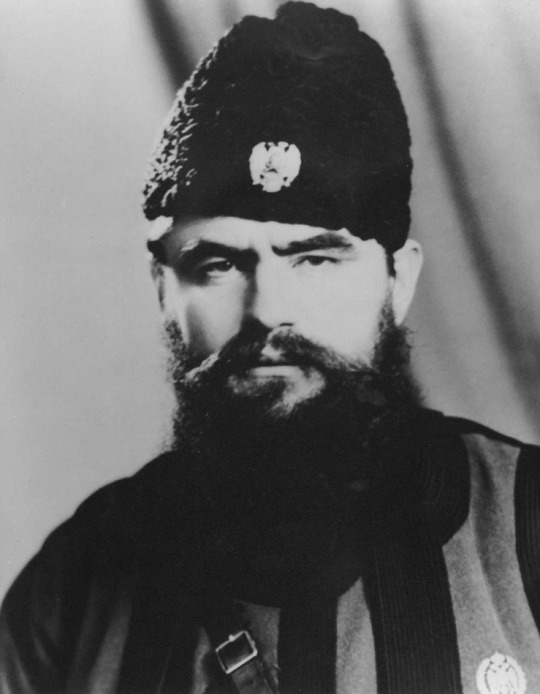
Momčilo Đujić (Serbo-Croatian Cyrillic: Момчилo Ђујић, Serbo-Croatian pronunciation: [mǒmtʃiːlo dʑûːjitɕ]; 27 February 1907 – 11 September 1999) was a Serbian Orthodox priest and Chetnik warlord (Serbo-Croatian: vojvoda, војвода). He led a significant proportion of the Chetniks within the northern Dalmatia and western Bosnia regions of the Independent State of Croatia (NDH), a fascist puppet state created from parts of the occupied Kingdom of Yugoslavia during World War II. In this role he collaborated extensively with the Italian and then the German occupying forces against the communist-led Partisan insurgency.
Đujić was ordained as a priest in 1933 and gained a reputation as something of a firebrand in the pulpit. After the assassination of King Alexander of Yugoslavia in 1934, he joined the Chetnik Association of Kosta Pećanac, forming several bands in the Knin region of Dalmatia. The Chetnik Association became a reactionary force used by the central government to oppress the populace. Active in promoting workers' rights, Đujić was briefly jailed for leading a protest by railroad workers, and he was a member of the exclusively-Serb Agrarian Union political party.
After the Axis invasion of Yugoslavia in April 1941, the Croatian Ustaše regime implemented a policy of widespread incarcerations, massacres, forced emigration and murder of Serbs and other groups, but Đujić escaped to the coastal zone annexed by Italy and began recruiting Chetniks in a refugee camp. When a general uprising began in August, Đujić returned to Knin and employed his Chetniks to defend local Serbs from the Ustaše, and under his command they captured the town of Drvar in the Bosanska Krajina. He then quickly began collaborating with the Italians, gaining their help through signing a non-aggression agreement. At this time, he was still aligned with the insurgency led by the communists. He soon betrayed them and began subverting Partisan units and attacking them alongside the Italians. He formed the Chetnik Dinara Division in early 1942. By mid-1942, Đujić was encouraging his Chetniks to co-operate with NDH forces, and on 1 October Chetniks under his command perpetrated a massacre of nearly 100 Croat civilians in the village of Gata. In early 1943 he attempted to participate on the Axis side in the Case White campaign against the Partisans but this was blocked by the Germans. In August, the Dinara Division suffered significantly at the hands of the Partisans and through desertion. By the time of the Italian capitulation in September it was of little use for offensive operations. When the Germans occupied the area, they restricted it to guarding railway tracks from Partisan sabotage. By November 1943, the Chetnik supreme commander, Draža Mihailović, was ordering Đujić to collaborate with the Germans. In November 1944, Đujić and 4,500 of his Chetniks combined with German and NDH forces in an attempt to defend Knin from the ascendant Partisans. Đujić progressively withdrew his troops until they surrendered to the western Allies in May 1945.
Đujić was tried and convicted in absentia for war crimes by the new Yugoslav communist government, which found him guilty of mass murder, torture, rape, robbery, forcible confinement and collaborating with the occupying forces. Included in these charges was responsibility for the deaths of 1,500 people. He eventually emigrated to the US, settling in California. He played an important role in Serbian émigré circles and founded the Ravna Gora Movement of Serbian Chetniks alongside other exiled Chetnik fighters. He later retired to San Marcos. In 1989, Đujić appointed the ultranationalist Serb politician Vojislav Šešelj as a Chetnik vojvoda. He later stated that he regretted awarding the title to Šešelj due to his involvement with Slobodan Milošević and his Socialist Party. In 1998, Biljana Plavšić, then President of the Republika Srpska, presented Đujić with an honorary award. Plavšić was later convicted of crimes against humanity related to her activities during the Bosnian War. Đujić died at a hospice in San Diego in 1999, aged 92. In Serbia, moves to rehabilitate the reputations of Đujić and the Chetnik movement have been criticised as historical revisionism and falsification of history.
https://en.wikipedia.org/wiki/Mom%C4%8Dilo_%C4%90uji%C4%87
4 notes
·
View notes
Text
Naija Politics Today: Tinubu is the Connect, while Atiku, Sowore and Obi are Distros, Rest Primeras

If you watched the Netflix series "in the show", you will hear words the connect, Distro, and Primeras. When you propagate the film into the political structure of Nigeria without using the term "Drug Dealers". One could only come to a certain conclusion about the current election and what other parties or candidates represent.
Take, for instance, the two major Distro in the Film by the street name Tommy and Ghost. They were the major distributor of drugs who depended on the "connect" to run their business successfully.
And the "connect" often as expected was propagated as usual to be one bad European, Italian, or Russian rather than U.S. The U.S is always propagated as the good guys, trying to catch the bad guys or trying to save the world.
Going back to the Political structure of Nigeria, we could call the part Ghost and Tommy played to be directly in line with the likes of Atiku, Sowore, and Obi. These three need the connection to run their business successfully, while the connection here is not Russian or Serbian but the U.S. or the west connection.
Meanwhile, Tinubu in the current political structure is the connect himself who may not necessarily depend on any kind of higher connection to run his Business.
One could argue Tinubu's PPP (private public partnership) initiative, a socialist economic idealogy borrowed from China is what makes him stand slightly different from the rest contestants. This is why I called the rest contestants Primeras cos none of them has the financial capability or moral authority to run a socialist government successfully. Neither Tinubu has such political will given the fact and figures in Nigeria. You cannot run a Socialist government in the current state of Nigeria.
No cheap Energy, no industrialization. So Nigeria is discapacitated in such regard to run any socialist government except you want to be like Ireland or Nederlands where debt per head is $200,000 to $400,000. Guess who you will owe all that too? The same puppet master. The western elites or the Globalist.
A more realistic approach which is pre-Chinese civil war would be to have the connect in charge of the Polity until you manage to industrialize, then civil upraising may then be fit to remove the elite government and continue to run the affairs in a socialist setting.
Read the full article
0 notes
Text
They can't be under any treaty under any law when they are reported dead.
If they were alive they could've claimed either under human rights either under a treaty. Since the Brexit international treaties of Europe have no jurisdiction court in Britain. Treaties are valid for political diplomacy not for civil laws.
If you claim citizen status the Government resident can offer you by discretion citizenship without being an asylum claimant.
That's the power of being a headteacher you have free choice to choose your topics syllabus. No one can promise you to enjoy a status because no one has permanent power directly. They are all puppets they regret actions. Stop dying for nothing and resolve the issue lawfully. What is marriage in private premises is lawful relationship while the behaviour is free as a citizen. Whether you choose to have children or not.
Serbian Government for instance issued citizenship to the Chinese people who wanted to migrate economically so Chinese did settle when I visit their shops Chinese speak the native Serbian language.
You have to accept the culture and the language whatever you settle.
I can't have Serbian citizenship regardless ancestral connection my birth children exhusband Serbian new Government has new rules in place. Social card depends on the main leader.
🤺🇬🇧
0 notes
Text
A list of people I will personally bare knuckle box in Hell when I die in no particular order
Andrew Jackson
Franklin Delano Roosevelt
Every politician that voted in favor of the new spending bill
Stalin
Hitler
Tojo
The members of the Serbian Nationalist Group The Black Hand responsible for the assignation of Archduke Franz Ferdinand
Karl Marx
Vladimir Lenin
Joe Biden and his puppet masters
Woodrow Wilson
Che Guevara
Fidel Castro
Mao
The people responsible for the Rwandan Genocide
Whoever actually killed John F. Kennedy-the more I think about it and the more I understand it the CIA had to be involved.
Teddy Roosevelt (he’s not in Hell, or did anything worth my fury, he’s actually my favorite president, but I’ll definitely have words for him about being stupid enough to allow the votes to be split 3 ways which would allow Woodrow fricken Wilson to become president instead of Taft.)
Benedict Arnold
Aaron Burr for letting his pride get in the way of logic and Alexander Hamilton for being a stupid, obnoxious, big government toting moron who just couldn’t keep his mouth shut.
LBJ for definitely having a hand in the assassination ofJFK
#I will make these people die again#except for my boy TR#teddy roosevelt#TR for LIFE!#american government#president#america#president-elect#cbm2040
1 note
·
View note
Photo
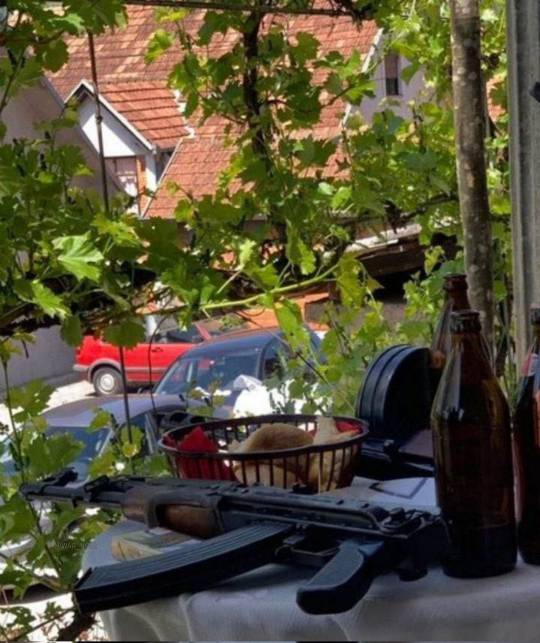
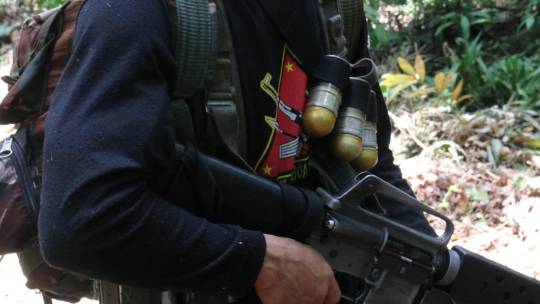

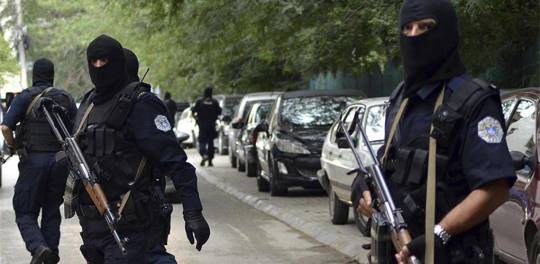
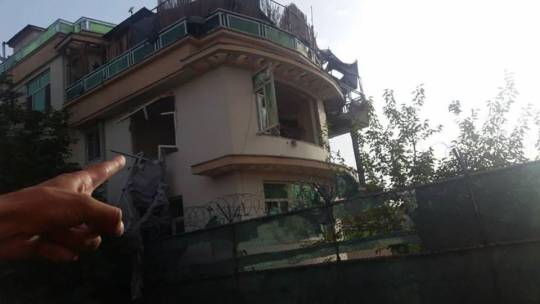
(via MW Weekly: IS Supporters Mock Zawahiri Killing; Tensions Simmer in West Balkans; ISKP Bombs Shiites in Kabul; Deadly Clashes in Nagorno-Karabakh)
MW Weekly: IS Supporters Mock Zawahiri Killing; Tensions Simmer in West Balkans; ISKP Bombs Shiites in Kabul; Deadly Clashes in Nagorno-Karabakh
The WannabeWonk
Islamic State Sympathizers Mock Zawahiri´s Death
Islamic State-linked (IS) Telegram accounts have expressed their amusement at the death of al-Qaeda´s leader, Ayman al-Zawahiri. They have also used the news to attack the Taliban, against whom they have increased their fighting efforts since the fall of Kabul last year.
An IS-linked account has accused the “Taliban National Army” of selling their ally to the United States as a token of friendship. The user names them as “the financial Taliban”. Another account defied the Taliban, asking if they would recognize the killing, or ignore it. They even asked if the Taliban would mourn Zawahiri and offer condolences.
Another user added: “Everyone should strive hard to invite the brothers in Afghanistan,” betting the killing of Zawahiri would benefit ISKP, expecting mass recruitment from former Taliban and al-Qaeda members. It is possible that many IS sympathizers expect the same.
Other IS sympathizers used the moment to attack the now-deceased Emir himself. One of them described him as wicked and recalled how Zawahiri rejoiced over the deaths of Islamic State leaders. Yet another user infers that the deceased leader worked for Western governments, and he was separately accused by IS jihadists of losing bin Laden’s legacy.
switched @switch_dA sample from Telegram of ISIS messages this morning on the death of the AQ leader.
3 Retweets11 Likes
August 2nd 2022
One IS sympathizer described Zawahiri as an enemy of God, and that his death meant nothing to them. He mentions Zawahiri was an “intelligence puppet” no longer having a role in the arena. He finishes by praising God for his death, wishing that all infidels “catch up” with him.
- Analysis by Guillermo Calderón López
Tensions Simmer in the West Balkans
Rumors of renewed conflict between ethnic Serbs and ethnic Albanians in Kosovo spread on social media on July 31st, and reports of roadblocks set up by Serbs in northern Kosovo were soon confirmed. These reports were quickly followed by those of unknown gunmen opening fire on Kosovo police units in the Zubin Potok municipality of Mitrovica District. Further videos where gunshots could be heard were circulated. Rumors of arrests accompanied reports of police taking fire, but the arrests were denied by authorities in Kosovo. Leaders in Pristina referred to those who did the shooting as “criminal groups” and “rebellious elements controlled by the Serbian government,” whom they similarly blamed for blocking border crossings between Kosovo and Serbia at Jarinjë and Brnjak, using heavy equipment and trucks.
NATO’s mission in Kosovo (KFOR), consisting of over 3,000 troops, declared its readiness to intervene in the event of hostilities between the two countries.
The seemingly sudden dust-up stemmed from a running dispute between authorities in Pristina and those in Belgrade. Since 2011, Serbia has refused to accept identification documents issued by the government in Kosovo to its citizens seeking to travel to Serbia, instead giving provisional IDs to those residing in Kosovo while they are in Serbia. In a reciprocal move, Pristina announced in June that those using Serbian-issued documents would be given provisional identification forms that would be valid for 90 days while in Kosovo.
Further, citizens of Kosovo using Serbian-issued number plates on their vehicles would be expected to replace these with number plates issued in Kosovo. In October 2021, a similarly tense moment between the two countries flared up over license plate disputes, which again saw Kosovo Serbs blocking roads and authorities in Pristina deploying special forces to the border with Serbia.
Once word of a possibly renewed armed conflict emerged on July 31st, photos posted by Kosovo Serbs of their personal Zastava AK-pattern rifles circulated on social media. A considerable number of civilians among Serbs and Albanians on either side of the Ibar River that divides their communities in northern Kosovo are armed with personal weapons.
The situation finally de-escalated when Pristina agreed to postpone the implementation of their reciprocity policies for one month—though, with no formal agreement between the two countries, it is still unclear what will come in September. Barricades blocking border crossings were still present on the night of August 1st, but have since been removed. Serbian President Aleksandar Vučić is supposed to meet with his Kosovar counterpart Prime Minister Albin Kurti in EU-backed talks on August 18th.
Despite upcoming talks, tensions between ethnic Serbs and the ethnic Albanian majority residing in Kosovo remain high. On August 6th, Kosovo police say their boat came under fire by “at least ten” gunshots while they were patrolling Gazivoda Lake in the north of the country near the border with Serbia. Head of the EU Rule of Law Mission to Kosovo (EULEX), Lars-Gunnar Wigemark, condemned the attack on Twitter, calling it “criminal” and promising that EULEX would increase its patrols in the north of Kosovo.
After Brief Lull, ISKP Targets Kabul’s Shiites with Bombings on Consecutive Days
After a period of relatively low activity by the Islamic State Khurasan Province (ISKP), the group claimed bombing operations on three consecutive days targeting Kabul’s Shiite community. The attacks come just prior to Ashura, a holiday celebrated by Shiite Muslims.
The first of these attacks took place on August 5th, when an explosive device hidden in a cart detonated near a mosque, killing at least eight people and wounding 18 others. The next day, a separate bombing in Kabul killed eight people and injured at least 22.
Abd. Sayed ترمذی سادات @abdsayeddThe ISC media outlet claimed a second ISKP IED attack in Kabul today, in the Sixth Police District, resulted in 30 casualties to the Shia community people and Taliban. Kabul police command confirmed this attack saying it resulted in 20 casualties, including two deaths. The ISC media outlet claimed this attack saying the ISKP killed and wounded 20 Shia community people in an IED attack in the Kariz area of Western Kabul today. https://t.co/rwlHWW6JJq
Abd. Sayed ترمذی سادات @abdsayedd
August 6th 2022
A third attack occurred on August 7th when a “magnetic mine” attached to a public transportation vehicle exploded in the Pul-e-Asmayi area of Kabul city. The Islamic State claimed responsibility for the attack the next day, on August 8.
Shortly before the attacks, the Taliban announced a counter-terrorism raid against an ISKP cell that killed four Islamic State fighters. According to Taliban spokesman Zabihullah Mujahid claimed, the ISKP cell was “planning to attack our Shiite compatriots during ongoing Muharram rituals.”
Ihsanullah Tipu Mehsud @IhsanTipuScene from Taliban intelligence service (DGI) op yesterday against ISKP fighters who attempted to attack Shia mourning session during Muharram in Karta Sakhi, Kabul. Explosive packed in a canister was thrown inside the building where ISKP fighters were trapped & refused surrender
17 Retweets69 Likes
August 4th 2022
Prior to the incidents, there was some speculation that Taliban security operations against ISKP may have degraded the group’s capabilities. It seems, however, that, despite the blows inflicted on the organization, they were laying low, regrouping, and preparing for attacks such as the Kabul bombings.
1 note
·
View note
Text
Events 6.28
1098 – Fighters of the First Crusade defeat Kerbogha of Mosul.
1360 – Muhammed VI becomes the tenth Nasrid king of Granada after killing his brother-in-law Ismail II.
1461 – Edward, Earl of March, is crowned King Edward IV of England.
1519 – Charles V is elected Emperor of the Holy Roman Empire.
1575 – Sengoku period of Japan: The combined forces of Oda Nobunaga and Tokugawa Ieyasu are victorious in the Battle of Nagashino.
1635 – Guadeloupe becomes a French colony.
1651 – The Battle of Berestechko between Poland and Ukraine starts.
1745 – A New England colonial army captures the French fortifications at Louisbourg (New Style).
1776 – American Revolutionary War: The Battle of Sullivan's Island ends with the American victory, leading to the commemoration of Carolina Day.
1776 – American Revolutionary War: Thomas Hickey, Continental Army private and bodyguard to General George Washington, is hanged for mutiny and sedition.
1778 – American Revolutionary War: The American Continentals engage the British in the Battle of Monmouth Courthouse resulting in standstill and British withdrawal under cover of darkness.
1797 – French troops disembark in Corfu, beginning the French rule in the Ionian Islands.
1807 – Second British invasion of the Río de la Plata; John Whitelocke lands at Ensenada on an attempt to recapture Buenos Aires and is defeated by the locals.
1838 – Coronation of Queen Victoria of the United Kingdom.
1841 – The Paris Opera Ballet premieres Giselle in the Salle Le Peletier.
1855 – Sigma Chi fraternity is founded in North America.
1859 – The first conformation dog show is held in Newcastle upon Tyne, England.
1865 – The Army of the Potomac is disbanded.
1870 – The US Congress establishes the first federal holidays (New Year Day, July 4th, Thanksgiving, and Christmas).
1880 – Australian bushranger Ned Kelly is captured at Glenrowan.
1881 – The Austro–Serbian Alliance of 1881 is secretly signed.
1882 – The Anglo-French Convention of 1882 marks the territorial boundaries between Guinea and Sierra Leone.
1894 – Labor Day becomes an official US holiday.
1895 – The United States Court of Private Land Claims rules James Reavis’s claim to Barony of Arizona is "wholly fictitious and fraudulent."
1896 – An explosion in the Newton Coal Company's Twin Shaft Mine in Pittston, Pennsylvania results in a massive cave-in that kills 58 miners.
1902 – The U.S. Congress passes the Spooner Act, authorizing President Theodore Roosevelt to acquire rights from Colombia for the Panama Canal.
1904 – The SS Norge runs aground on Hasselwood Rock in the North Atlantic 430 kilometres (270 mi) northwest of Ireland. More than 635 people die during the sinking.
1911 – The Nakhla meteorite, the first one to suggest signs of aqueous processes on Mars, falls to Earth, landing in Egypt.
1914 – Archduke Franz Ferdinand of Austria and his wife Sophie are assassinated in Sarajevo; this is the casus belli of World War I.
1917 – World War I: Greece joins the Allied powers.
1919 – The Treaty of Versailles is signed, ending the state of war between Germany and the Allies of World War I.
1921 – Serbian King Alexander I proclaims the new constitution of the Kingdom of Serbs, Croats and Slovenes, known thereafter as the Vidovdan Constitution.
1922 – The Irish Civil War begins with the shelling of the Four Courts in Dublin by Free State forces.
1926 – Mercedes-Benz is formed by Gottlieb Daimler and Karl Benz merging their two companies.
1936 – The Japanese puppet state of Mengjiang is formed in northern China.
1940 – Romania cedes Bessarabia and Northern Bukovina to the Soviet Union after facing an ultimatum.
1942 – World War II: Nazi Germany starts its strategic summer offensive against the Soviet Union, codenamed Case Blue.
1945 – Poland's Soviet-allied Provisional Government of National Unity is formed over a month after V-E Day.
1948 – Cold War: The Tito–Stalin Split results in the expulsion of the League of Communists of Yugoslavia from the Cominform.
1948 – Boxer Dick Turpin beats Vince Hawkins at Villa Park in Birmingham to become the first black British boxing champion in the modern era.
1950 – Korean War: Suspected communist sympathizers (between 60,000 and 200,000) are executed in the Bodo League massacre.
1950 – Korean War: Packed with its own refugees fleeing Seoul and leaving their 5th Division stranded, South Korean forces blow up the Hangang Bridge in an attempt to slow North Korea's offensive. The city falls later that day.
1950 – Korean War: North Korean Army conducts the Seoul National University Hospital massacre.
1956 – In Poznań, workers from HCP factory go to the streets, sparking one of the first major protests against communist government both in Poland and Europe.
1964 – Malcolm X forms the Organization of Afro-American Unity.
1969 – Stonewall riots begin in New York City, marking the start of the Gay Rights Movement.
1973 – Elections are held for the Northern Ireland Assembly, which will lead to power-sharing between unionists and nationalists in Northern Ireland for the first time.
1976 – The Angolan court sentences US and UK mercenaries to death sentences and prison terms in the Luanda Trial.
1978 – The United States Supreme Court, in Regents of the University of California v. Bakke bars quota systems in college admissions.
1981 – A powerful bomb explodes in Tehran, killing 73 officials of the Islamic Republican Party.
1982 – Aeroflot Flight 8641 crashes in Mazyr, Belarus, killing 132 people.[5]
1987 – For the first time in military history, a civilian population is targeted for chemical attack when Iraqi warplanes bombed the Iranian town of Sardasht.
1989 – On the 600th anniversary of the Battle of Kosovo, Slobodan Milošević delivers the Gazimestan speech at the site of the historic battle.
1997 – Holyfield–Tyson II: Mike Tyson is disqualified in the third round for biting a piece off Evander Holyfield's ear.
2001 – Slobodan Milošević is extradited to the ICTY in The Hague to stand trial.
2004 – Iraq War: Sovereign power is handed to the interim government of Iraq by the Coalition Provisional Authority, ending the U.S.-led rule of that nation.
2009 – Honduran president Manuel Zelaya is ousted by a local military coup following a failed request to hold a referendum to rewrite the Honduran Constitution. This was the start of the 2009 Honduran constitutional crisis.
2016 – A terrorist attack in Turkey's Istanbul Atatürk Airport kills 42 people and injures more than 230 others.
0 notes
Text
THE POLITICAL SITUATION IN SERBIA RE:CURRENT PANDEMIC + PROTESTS IN SERBIA, July 7/8th
In late February and early March, the Serbian government completely dictated lead by President Aleksandar Vučić of the Serbian Progressive Party (Srpska napredna stranka, or SNS) stood behind ‘expert’ claims that “[the novel coronavirus] is the most laughable virus in the history of humankind [...]”, promptly followed by country-wide lockdown and an emergency state declared on March 15th, ending on May 5th
A major thing affected by the lockdown were college students, who had to immediately shift to online classes, while also losing exam terms. After the emergency state, the Ministry of Education and the Serbian universities decided to simply pretend nothing of importance happened, and that two months of lockdown absolutely had no effect on the students. They decided to simply move onward; the students had to return to class and had to take exams in a hazardous environment.
Another major thing affected by the lockdown were the 2020 parliamentary elections, initially planned for April 26th, postponed indefinitely, and subsequently scheduled for June 21st.
Immediately after lockdown and the emergency state ended, the election campaign began, during which the government lifted almost all safety measures against HCoV-19. Every news outlet in Serbia parroted the government claims, you are safe, the elections can be held, it will soon be over.
Let’s take a look at what the ‘official’ COVID-19 statistics for Serbia have to say!

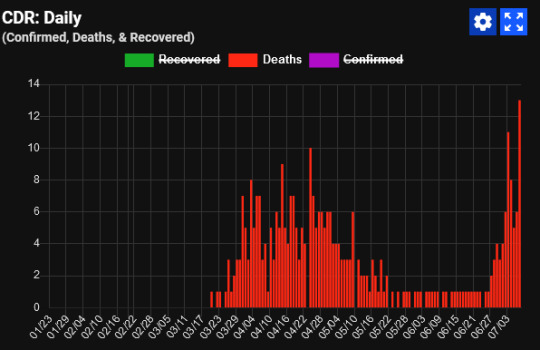
(Graphs taken from https://covid19info.live/serbia/)
you have one (1) attempt to guess when campaigning officially started
After the elections were held (the fraudulence of which merits many more posts, but let me assure you, they were quite blatantly fraudulent), the number of cases magically grew and the government needed someone to blame, because of course it wasn’t the elections how could it possibly be
So they blamed the college students. The students who were forced to go back to classes and exams and dormitories by the Ministry and the universities. Quite literally in the middle of the June-July exam terms, the government declared the students were to blame and that all dorms would be shut down, effective immediately.
In the previous week, there have been student protests. The students were thrown out on the streets, and thus began peacefully protesting.
The protests were very quickly hijacked by several groups: the rabid sports fans (violent, go very much with the white nationalist vibe), chanting about Kosovo (another extremely complicated situation that has nothing to do with this); and the various political parties of the opposition, who claimed they organized the protests.
Last night’s protests (July 7th/8th) were sparked by the government once again shifting all blame for the resurgence of COVID-19 on the people.
International news services are reporting that the protests are “against the ‘rona” or against the newly-installed safety measures.
This is not correct.
Serbian news services are stating that the people on the streets are violent.
This is not correct.
The few posts that I have seen on the topic of last night’s protests claim that “everyone is protesting, from the extreme left, to the extreme right”.
This is also not correct.
The police came out with horses and tear gas and a desire to hurt as many people as possible.
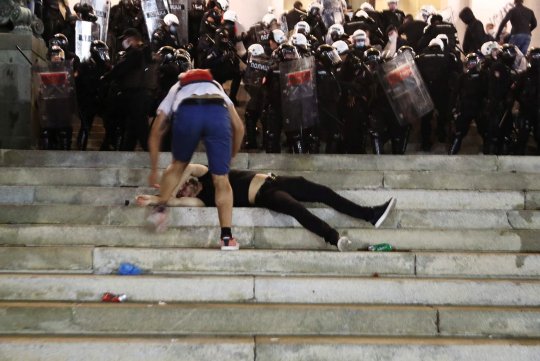
(photo by Reuters)
Only one news service is reporting the situation. The other news outlets ignored all that was happening last night. This morning, they began pinning the protests to various political figures, calling the people on the streets fascists, and claiming the police acted completely passively.
There have been attempts to hijack the protests by rabid sports fans, by various opposing political parties, including the extreme right, and they have all been stopped for now, but the puppets of the state are doing everything they can to undermine that.
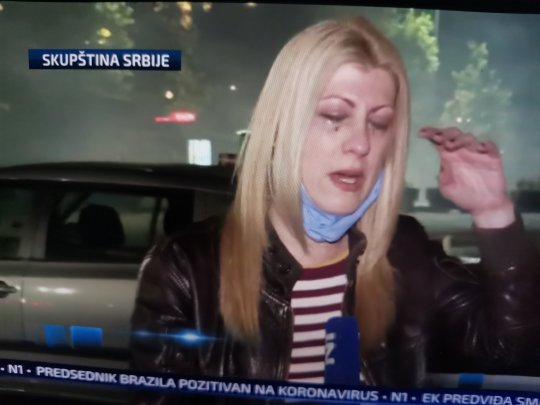
This is Jelena Zorić, a reporter of N1, the only news service that was on the scene. She had just been tear-gassed.
These protests are against the dictatorship of Aleksandar Vučić, total media control, nepotism, freedom of speech violations, deliberate misinformation of the public, and falsifying COVID-19 statistics in the government’s favor to hold fraudulent elections.
These protests are not affiliated with any party, left or right. These protests are not ‘unifying the left and right’. These protests belong to the people, and the people alone.
106 notes
·
View notes
Text
This bizarre and shocking reaction to the public suicide of a war criminal has its roots in Croatia’s troubled relation towards the past, beginning with WWII when Croatia was a fascist puppet-state. Franjo Tudjman, the first president of the newly established Republic of Croatia, stated in 1990 that the so-called Independent State of Croatia (NDH) was ‘not only a quisling construction, but also an expression of the desire of the Croatian people for independence’. In the eyes of the far-right leadership of the Croatian Democratic Union (HDZ), the largest party in the current coalition government, the new Croatia was a continuation of the NDH. According to the HDZ, a country that is defending itself can not commit war crimes. Franjo Tudjman’s speeches, conversations and ideas – meticulously recorded in his autobiography and in a number of documents and on tapes – were of great help in prosecuting Praljak and the other five defendants. But nobody likes to hear that today, since it might tarnish the image of Tudjman as the Founding Father.
In the last few years, the HDZ has turned sharply to the right. Its leading politicians and the Catholic Church express openly revisionist views. One infamous example was the placing of a memorial plaque with a fascist salute in close proximity to the site of the former WWII concentration camp in Jasenovac. Among the taboo topics, the biggest are Croatian aggression in Bosnia and the civil war between the Serbian and Croatian populations in Croatia. The public television station HRT recently instructed its staff journalists to respect in their work a parliamentary document from 2000 entitled ‘Declaration on the war for the homeland’. Talk show host Aleksandar Stanković was reprimanded for failing to do so. The document states that Croatia waged a just, legitimate, defensive war.
The government is not reacting merely to the guilty verdict. Preljak is being used as a pretext – the real protest is directed at the confirmation of Croatian aggression in Bosnia, the aim of which was the annexation of Herzegovina (a part of Bosnia with a majority Croatian population). This is complicated by the fact that Croatia, under pressure from the USA, signed the Washington Treaty in 1994, thus becoming an ally of the Bosnian army against the Serbs. The verdict also opens up the issue of reparations for the tens of thousands of people who passed through the Croatian concentration camps in Bosnia. The protests need to be seen as a response to this too.
Finally, if Croatia’s two highest ranking politicians were forced to make such statements, then they did so out of self-interest: both the prime minister and the president are brought to and kept in power by the most radical wing of the HDZ. If they want to keep their posts, they must behave accordingly.
It seems that the Croatian government is no longer much worried by the country’s image abroad. If it has learned a single lesson in the past four years of EU membership, it is that once you are in, you can do what you want – just like Hungary and Poland. If big and important countries can behave like this, then small and unimportant Croatia can permit itself even more. But perhaps the display of nationalism and revisionism went too far. Let us hope that rejecting the ICTY verdict and turning war criminals into heroes is simply too much even for a disoriented European Union.
Playing to the audience: The televised suicide of Slobodan Praljak
1 note
·
View note
Text
Tuesday, April 20, 2021
Minneapolis Braces for Verdict in Floyd’s Death
(NYT) MINNEAPOLIS—Around midday last Monday, Samir Patel received a phone call from his friend, a dentist: Gunshots had rung out, his friend told him, and the contractors who were rebuilding the office he lost in last year’s unrest had fled. He was boarding up, and he told Mr. Patel he should move quickly to protect his own business, a dry cleaning shop. Elite Cleaners, Mr. Patel’s shop, is on a side street, not far from the shell of the Minneapolis Police Department’s Third Precinct station house, which burned last year in the aftermath of George Floyd’s death. The surrounding community of Lake Street, a corridor of immigrant-owned businesses—taquerias, furniture shops, liquor stores and cafes—was devastated by looting in the days of protests and the riots that followed. The city has said that the unrest led to $350 million in losses, with more than a thousand buildings either destroyed or damaged. As the trial of Derek Chauvin, the white former police officer charged with murder in the death of Mr. Floyd, a Black man, draws to a close, the city is on edge, fearing that a not-guilty verdict would bring anger, chaos and destruction once again.
New migrant facilities crop up to ease crowding, again
(AP) For the third time in seven years, U.S. officials are scrambling to handle a dramatic spike in children crossing the U.S.-Mexico border alone, leading to a massive expansion in emergency facilities to house them as more kids arrive than are being released to close relatives in the United States. More than 22,000 migrant children were in government custody as of Thursday, with 10,500 sleeping on cots at convention centers, military bases and other large venues likened to hurricane evacuation shelters with little space to play and no privacy. More than 2,500 are being held by border authorities in substandard facilities. So many children are coming that there’s little room in long-term care facilities, where capacity shrank significantly during the coronavirus pandemic. As a result, minors are packed into Border Patrol facilities not meant to hold them longer than three days or they’re staying for weeks in the mass housing sites that often lack the services they need. Lawyers say some have not seen social workers who can reunite them with family in the U.S. Both Donald Trump and Barack Obama faced similar upticks in Central American children crossing the border alone in 2019 and 2014. The numbers have now reached historic highs amid economic fallout from the pandemic, storms in Central America and the feeling among migrants that Biden is more welcoming than his predecessor.
Students’ struggles pushed Peru teacher to run for president
(AP) As schools across Peru closed due to the coronavirus pandemic, Pedro Castillo tried to find a way to keep classes going for his 20 fifth- and sixth-grade students. But in his impoverished rural community deep in the Andes, his efforts were futile. Seventeen of the students didn’t even have access to a cellphone. Tablets promised by the government never arrived. “Where is the state?” Castillo, 51, told The Associated Press after a day of planting sweet potatoes on his own land. It was the last straw for Castillo, who over 25 years had seen his students struggle in crumbling schools where teachers also cook, sweep floors and file paperwork. He’d already dabbled in activism with the local teachers’ union and helped lead a national strike in 2017. But now he went further, tossing his name into a crowd of 18 candidates in Peru’s presidential election. Defying the polls, the elementary school teacher came first in the April 11 voting, albeit with less than 20% of the overall vote. The stunning result gave him a place in June’s presidential runoff against Keiko Fujimori, one of Peru’s most established political figures and the daughter of former president Alberto Fujimori. It is her third attempt to become president. Castillo’s unlikely campaign comes at a turbulent time for the South American nation that has suffered like few others from the COVID-19 pandemic. It recently ran through three presidents in a week after one was removed by congress over corruption allegations. Every president of the past 36 years has been ensnared in corruption allegations, some imprisoned. One died by suicide before police could arrest him.
New direction needed: EU launches website for citizens to discuss its future
(Reuters) The European Union launched on Monday a website for citizens to debate the future of the 27-nation bloc as the exit of Britain, climate change, the COVID-19 pandemic and the rise of nationalism force the EU to reflect on how it wants to develop. The website, available for contributions in the EU’s 24 official languages, is part of what EU institutions call the Conference on the Future of Europe—a forum for debate to help identify issues the EU needs to address in the changing global context. “The conclusions of the conference could be the backbone for reforms in the Union in the future,” one of the leaders of the initiative, member of European Parliament and former Belgian Prime Minister Guy Verhofstadt told a news conference. The website prompts debates on subjects including climate change, the environment, health, the economy, social justice and jobs, the role of the EU in the world, values and rights, the rule of law, security, digital transformation, democracy and migration. Citizens can also launch their own topics.
Cheating at Greek universities
(Foreign Policy) Greek universities are experiencing a crisis of confidence in their students as remote learning takes the place of traditional education. Professors have noted surprisingly high marks from previously poor students, raising suspicions that the students may be using underhanded tactics. “Result averages are up, and people we haven’t seen in years are showing up for exams because the system makes it easy to cheat,” Kostas Kosmatos, an assistant professor of criminology at Thrace’s Democritus University told AFP. Sofia, a psychology student, admitted to have taken two exams “on behalf of two of my friends and nobody realized.” Resourceful students have created technological workarounds to boost their chances during exams, crowdsourcing answers in live chats with students at the University of Crete even enlisting a linguistic expert to help them during exams. “But even he got a verse wrong,” Angela Kastrinaki, dean of the University of Crete’s literature department, told AFP. “So I got 50 papers with the same mistake. It was funny.”
Russia Expels 20 Czech Diplomats as Tensions Escalate
(NYT) A day after the government of the Czech Republic blamed operatives from Russia’s military intelligence agency for a series of mysterious explosions at an ammunition depot in 2014 and expelled 18 Russian diplomats, the Russian government announced on Sunday that 20 Czech diplomats would be ejected in response. The expulsions signal further escalation of tensions between the Kremlin and western governments, reaching an intensity not seen since the Cold War. The spat between the Czech Republic and Russia comes just days after the United States imposed heavy sanctions on Russian government officials and businesses in response to a large-scale hacking of American government computer systems. In a statement, the Russian Foreign Ministry called the Czech accusations “absurd” and accused the government of being an American puppet. “In an effort to please the U.S.A. following recent American sanctions against Russia, the Czech government in this instance even exceeded its overseas masters,” the Russian Foreign Ministry statement said.
Montenegro’s billion-dollar dilemma
(NYT) Few Europeans thought it was a good idea for Montenegro to take a mammoth loan from China to build a highway. Now the tiny, mountainous country is asking the European Union for help to repay the debt—and the answer, so far, has been no. The situation in Montenegro is the latest skirmish in an escalating global push for influence by China, which has made inroads in economically weak countries by offering loans that demand loyalty to Beijing but otherwise have few strings attached. Montenegro’s first debt payments are due this summer. The $1 billion loan is nearly a fifth the size of the country’s entire economy. Montenegrin leaders say they won’t miss their loan payment this summer even if no E.U. aid is forthcoming. European officials said they wanted to help Montenegro but were searching for a palatable way to do so. Linking the aid to the loan too directly could be politically difficult, since many E.U. officials do not want to be in the position of effectively paying down a Chinese loan that E.U. leaders warned against in the first place. “China has been filling any opening it felt it could,” said Vuk Vuksanovic, a researcher at the Belgrade Center for Security Policy, a Serbian think tank. “Local capitals were hungry for cash, particularly on big development issues like infrastructure. And the Chinese were willing to go places where Western institutions were not.”
Afghan Women Fear the Worst, Whether War or Peace Lies Ahead
(NYT) Farzana Ahmadi watched as a neighbor in her village in northern Afghanistan was flogged by Taliban fighters last month. The crime: Her face was uncovered. People silently watched as the beating dragged on. Fear—even more potent than in years past—is gripping Afghans now that U.S. and NATO forces will depart the country in the coming months. They will leave behind a publicly triumphant Taliban, who many expect will seize more territory and reinstitute many of the same oppressive rules they enforced under their regime in the 1990s. The New York Times spoke to many Afghan women about what comes next in their country, and they all said the same thing: Whatever happens will not bode well for them. Whether the Taliban take back power by force or through a political agreement with the Afghan government, their influence will almost inevitably grow. In a country in which an end to nearly 40 years of conflict is nowhere in sight, many Afghans talk of an approaching civil war. “All the time, women are the victims of men’s wars,” said Raihana Azad, a member of Afghanistan’s Parliament. “But they will be the victims of their peace, too.”
Hard-line Islamists take 6 Pakistani security personnel hostage amid deadly clashes
(Washington Post) A hard-line Islamist group on Sunday took six Pakistani security personnel hostage after days of deadly clashes in the northeastern city of Lahore over a French satirical newspaper’s publication of cartoons depicting the prophet Muhammad and the arrest of the group’s leader by Pakistani authorities. A senior police officer and two paramilitary fighters were among those taken after protesters surrounded a police station and stormed the compound, according to Lahore police spokesman Arif Rana. A week of violence across the country has left at least four dead, according to the protesters. Police officials say thousands have been arrested. The tensions driving the protests, led by the Islamist party Tehrik-e-Labbaik Pakistan, have been simmering for months after French President Emmanuel Macron honored a teacher who was beheaded last year in France after he showed a class the cartoons depicting Muhammad. For many Muslims, depictions of the prophet are blasphemous and deeply insulting. Macron’s comments sparked protests across the Muslim world last year.
India’s capital to lock down as nation’s virus cases top 15M
(AP) New Delhi was being put under a weeklong lockdown Monday night as an explosive surge in coronavirus cases pushed the India’s capital’s health system to its limit. Chief Minister Arvind Kejriwal said in a news conference the national capital was facing shortages of oxygen and some medicine. “I do not say that the system has collapsed, but it has reached its limits,” Kejriwal said, adding that harsh measures were necessary to “prevent a collapse of the health system.” Similar virus curbs already have been imposed in the worst-hit state of Maharashtra, home to India’s financial capital, Mumbai. The closure of most industries, businesses and public places Wednesday night is to last 15 days.
Pacific Ocean storm intensifies into year’s first super typhoon
(Reuters) Strong winds and high waves lashed the eastern Philippines on Monday as the strongest typhoon ever recorded in April barrelled past in the Pacific Ocean, killing one man and triggering flooding in lower-lying communities, disaster officials said. More than 100,000 people were evacuated from coastal areas, according to provincial disaster agencies. The core of Surigae, or Bising as the storm is known locally, is not expected to hit land. But with a diameter of 500 km and winds reaching 195 km per hour, parts of the eastern islands of Samar experienced flooding, while several communities lost power. The first super typhoon of 2021 foreshadows a busy storm season for the region in the year ahead, experts say.
Lebanon’s crumbling capital
(AFP) Beirut’s roads are riddled with potholes, many walls are covered in anti-government graffiti and countless street lamps have long since gone dark. At night, car drivers creep cautiously past broken traffic lights and strain their eyes for missing manhole covers, stolen for the value of their metal. Many parking metres have been disabled in protest over an alleged corruption scandal, while cars are parked randomly on sidewalks. To many, the dysfunctional capital has become emblematic of a country mired in its worst crisis since the 1975-1990 civil war after decades of mismanagement and corruption. Much of Beirut’s infrastructure started falling apart long before last August’s massive portside explosion killed more than 200 people, levelled the waterfront and damaged countless buildings. Amid the crisis, the Lebanese currency has collapsed and continues its downward slide at a sickening rate that in itself is deepening the problem. As the currency has dived by more than 85 percent on the black market, wary contractors are steering clear of any municipal repairs that are paid for in Lebanese pounds.
Eleven dead, 98 injured after train derails in Egypt
(Reuters) Eleven people were killed and 98 injured on Sunday in a train accident in Egypt’s Qalioubia province north of Cairo, the health ministry said in a statement. The train was heading from Cairo to the Nile Delta city of Mansoura when four carriages derailed at 1:54 p.m. (1154 GMT), about 40 kms (25 miles) north of Cairo. More than 50 ambulances took the injured to three hospitals in the province, the health ministry said. The derailing is the latest of several recent railway crashes in Egypt. At least 20 people were killed and nearly 200 were injured in March when two trains collided near Tahta, about 440 kms (275 miles) south of Cairo.
South Africa wildfire
(Washington Post) Cape Town ordered precautionary evacuations of communities living along the edges of city landmark Table Mountain on Monday as firefighters struggled to contain a fire that gutted historical landmarks, including the oldest working windmill in South Africa and a library housing African antiquities at the University of Cape Town. The fire started Sunday morning near the memorial to colonial leader Cecil Rhodes and quickly spread uncontrolled beneath Devil’s Peak in Table Mountain National Park in an area popular with weekend hikers and cyclists. By Monday morning, strong southeasterly winds, which were expected to reach more than 30 miles per hour (50 km/h) later in the day, had pushed the fire toward densely-populated areas above Cape Town city. Well-known tourist sites, such as the Table Mountain aerial cableway, were temporarily closed. Heavy smoke engulfed the city forcing the closure of a major highway and other nearby roads. Hikers, park visitors, visitors to the nearby Kirstenbosch National Botanical Garden and hundreds of students from the university campus were evacuated on Sunday.
NASA’s Ingenuity Makes First Powered Flight On Mars
(NPR) “Orville and Wilbur would be proud. NASA’s Ingenuity helicopter has made the first-ever powered flight on another planet, 117 years after the Wright Brothers’ historic flight on this planet. The flight itself was modest. The 4-pound helicopter rose 10 feet in the air, hovered briefly, and returned to the Martian surface.
3 notes
·
View notes
Text
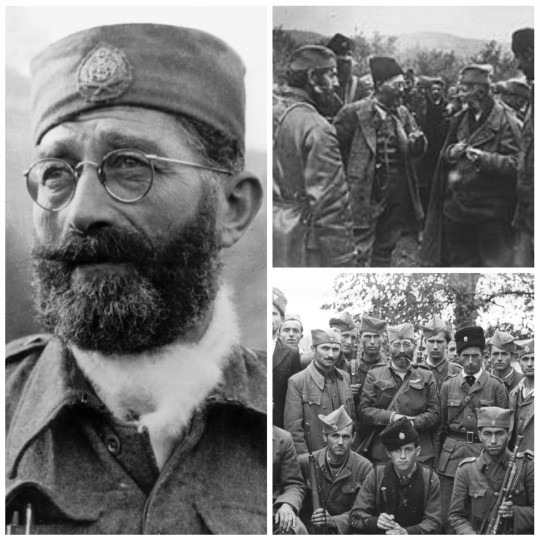
• Draža Mihailović
Dragoljub "Draža" Mihailović was a Yugoslav Serb general during World War II. A staunch royalist, he retreated to the mountains near Belgrade when the Germans overran Yugoslavia in April 1941 and there he organized bands of guerrillas known as the Chetnik Detachments of the Yugoslav Army.
Dragoljub "Draža" Mihailović was born on April 27th, 1893 in Ivanjica, Kingdom of Serbia to Mihailo and Smiljana Mihailović. His father was a court clerk. Orphaned at seven years of age, Mihailović was raised by his paternal uncle in Belgrade. As both of his uncles were military officers, Mihailović himself joined the Serbian Military Academy in October 1910. He fought as a cadet in the Serbian Army during the Balkan Wars of 1912–13 and was awarded the Silver Medal of Valor at the end of the First Balkan War, in May 1913. At the end of the Second Balkan War, during which he mainly led operations along the Albanian border, he was given the rank of second lieutenant as the top soldier in his class, ranked sixth at the Serbian military academy. He served in World War I and was involved in the Serbian Army's retreat through Albania in 1915. He later received several decorations for his achievements on the Salonika Front. Following the war, he became a member of the Royal Guard of the Kingdom of Serbs, Croats and Slovenes but had to leave his position in 1920 after taking part in a public argument between communist and nationalist sympathizers.
He was subsequently stationed to Skopje. In 1921, he was admitted to the Superior Military Academy of Belgrade. In 1923, having finished his studies, he was promoted as an assistant to the military staff, along with the fifteen other best alumni of his promotion. He was promoted to the rank of lieutenant colonel in 1930. That same year, he spent three months in Paris, following classes at the École spéciale militaire de Saint-Cyr. Some authors claim that he met and befriended Charles de Gaulle during his stay, although there is no known evidence of this. In 1935, he became a military attaché to the Kingdom of Bulgaria and was stationed to Sofia. On September 6th, 1935, he was promoted to the rank of colonel. Mihailović then came in contact with members of Zveno and considered taking part in a plot which aimed to provoke Boris III's abdication and the creation of an alliance between Yugoslavia and Bulgaria, but, being untrained as a spy, he was soon identified by Bulgarian authorities and was asked to leave the country. He was then appointed as an attaché to Czechoslovakia in Prague.
His military career almost came to an abrupt end in 1939, when he submitted a report strongly criticizing the organization of the Royal Yugoslav Army. Among his most important proposals were abandoning the defence of the northern frontier to concentrate forces in the mountainous interior; re-organizing the armed forces into Serb, Croat, and Slovene units in order to better counter subversive activities; and using mobile Chetnik units along the borders. Milan Nedić, the Minister of the Army, was incensed by Mihailović's report and ordered that he be confined to barracks for 30 days. Afterwards, Mihailović became a professor at Belgrade's staff college. In the summer of 1940, he attended a function put on by the British military attaché for the Association of Yugoslav Reserve NCOs. The meeting was seen as highly anti-Nazi in tone, and the German ambassador protested Mihailović's presence. Nedić once more ordered him confined to barracks for 30 days as well as demoted and placed on the retired list. These last punishments were avoided only by Nedić's retirement in November. In the years preceding the Axis invasion of Yugoslavia, Mihailović was stationed in Celje, Drava Banovina (modern Slovenia). At the time of the invasion, Colonel Mihailović was an assistant to the chief-of-staff of the Yugoslav Second Army in northern Bosnia. He briefly served as the Second Army chief-of-staff prior to taking command of a "Rapid Unit" (brzi odred) shortly before the Yugoslav High Command capitulated to the Germans on April 17th, 1941.
Following the invasion and occupation of Yugoslavia by Germany, Italy, Hungary, a small group of officers and soldiers led by Mihailović escaped in the hope of finding Yugoslavian units still fighting in the mountains. After skirmishing with several Ustaše and Muslim bands and attempting to sabotage several objects, Mihailović and about 80 of his men crossed the Drina River into German-occupied Serbia. Mihailović planned to establish an underground intelligence movement and establish contact with the Allies, though it is unclear if he initially envisioned to start an actual armed resistance movement. For the time being, Mihailović established a small nucleus of officers with an armed guard, which he called the "Command of Chetnik Detachments of the Yugoslav Army". After arriving at Ravna Gora in early May 1941, he realized that his group of seven officers and twenty-four non-commissioned officers and soldiers was the only one. He began to draw up lists of conscripts and reservists for possible use. His men at Ravna Gora were joined by a group of civilians, mainly intellectuals from the Serbian Cultural Club, who took charge of the movement's propaganda sector. The Chetniks of Kosta Pećanac, which were already in existence before the invasion, did not share Mihailović's desire for resistance. In order to distinguish his Chetniks from other groups calling themselves Chetniks, Mihailović and his followers identified themselves as the "Ravna Gora movement". The stated goal of the Ravna Gora movement was the liberation of the country from the occupying armies of Germany, Italy and the Ustaše.
Mihailović spent most of 1941 consolidating scattered remnants and finding new recruits. In August, he set up a civilian advisory body, the Central National Committee, composed of Serb political leaders including some with strong nationalist views such as Dragiša Vasić and Stevan Moljević. Mihailović first established radio contact with the British in September 1941, when his radio operator raised a ship in the Mediterranean. On September 13th, Mihailović's first radio message to King Peter's government-in-exile announced that he was organizing Yugoslavia remnants to fight against the Axis powers. Mihailović also received help from officers in other areas of Yugoslavia, such as Slovene officer Rudolf Perinhek, who brought reports on the situation in Montenegro. Mihailović sent him back to Montenegro with written authorization to organize units there. Mihailović's strategy was to avoid direct conflict with the Axis forces, intending to rise up after Allied forces arrived in Yugoslavia. Mihailović's Chetniks had had defensive encounters with the Germans, but reprisals and the tales of the massacres in the Axis puppet state of Croatia made them reluctant to engage directly in armed struggle, except against the Ustaše in Serbian border areas. By the end of August, Mihailović's Chetniks and Josep "Tito" Broz's Partisans began attacking Axis forces, sometimes jointly despite their mutual diffidence, and captured numerous prisoners. On October 28th, 1941 Mihailović received an order from the Prime Minister of the Yugoslav Government in exile Dušan Simović who urged Mihailović to avoid premature actions and avoid German reprisals. Mihailović discouraged sabotage due to German reprisals (such as more than 3,000 killed in Kraljevo and Kragujevac) unless some great gain could be accomplished. Instead, he favoured sabotage that could not easily be traced back to the Chetniks. His reluctance to engage in more active resistance meant that most sabotage carried out in the early period of the war were due to efforts by the Partisans, and Mihailović lost several commanders and a number of followers who wished to fight the Germans to the Partisan movement.
Even though Mihailović initially asked for discreet support, propaganda from the British and from the Yugoslav government-in-exile quickly began to exalt his feats. The creation of a resistance movement in occupied Europe was received as a morale booster. Mihailović soon realized that his men did not have the means to protect Serbian civilians against German reprisals. The prospect of reprisals also fed Chetnik concerns regarding a possible takeover of Yugoslavia by the Partisans after the war, and they did not wish to engage in actions that might ultimately result in a post-war Serb minority. Mihailović's strategy was to bring together the various Serb bands and build an organization capable of seizing power after the Axis withdrew or were defeated, rather than engaging in direct confrontation with them. In contrast to the reluctance of Chetnik leaders to directly engage the Axis forces, the Partisans advocated open resistance, which appealed to those Chetniks desiring to fight the occupation. On September 19th, 1941, Tito met with Mihailović to negotiate an alliance between the Partisans and Chetniks, but they failed to reach an agreement as the disparity of the aims of their respective movements was great enough to preclude any real compromise. In mid-November, the Germans launched an offensive against the Partisans, Operation Western Morava, which bypassed Chetnik forces. Having been unable to quickly overcome the Chetniks, faced with reports that the British considered Mihailović as the leader of the resistance, and under pressure from the German offensive, Tito approached Mihailović with an offer to negotiate, which resulted in talks and later an armistice between the two groups on November 21st. Mihailović did not resume radio transmissions with the Allies before January 1942. In early 1942, the Yugoslav government-in-exile reorganized and appointed Slobodan Jovanović as prime minister, and the cabinet declared the strengthening of Mihailović's position as one of its primary goals. On January 11th, Mihailović was named "Minister of the Army, Navy and Air Forces" by the government-in-exile.
In Montenegro, Mihailović found a complex situation. The local Chetnik leaders, Bajo Stanišić and Pavle Đurišić, had reached arrangements with the Italians and were cooperating with them against the communist-led Partisans. Mihailović later claimed at his trial in 1946 that he was unaware of these arrangements prior to his arrival in Montenegro, and had to accept them once he arrived. Mihailović believed that Italian military intelligence was better informed than he was of the activities of his commanders. He tried to make the best of the situation and accepted the appointment of Blažo Đukanović as the figurehead commander of "nationalist forces" in Montenegro. While Mihailović approved the destruction of communist forces, he aimed to exploit the connections of Chetniks commanders with the Italians to get food, arms and ammunition in the expectation of an Allied landing in the Balkans. Having become more and more concerned with domestic enemies and concerned that he be in a position to control Yugoslavia after the Allies defeated the Axis, Mihailović concentrated from Montenegro on directing operations, in the various parts of Yugoslavia, mostly against Partisans, but also against the Ustaše and Dimitrije Ljotić's Serbian Volunteer Corps (SDK). During the autumn of 1942, Mihailović's Chetniks at the request of the British organization sabotaged several railway lines used to supply Axis forces in the Western Desert of northern Africa. Adolf Hitler wrote to Benito Mussolini on February 16th, 1943, demanding that in addition to the partisans be pursued the chetniks who possessed "a special danger in the long-term plans that Mihailovic's supporters were building." Hitler adds: "In any case, the liquidation of the Mihailovic movement will no longer be an easy task, given the forces at its disposal and the large number of armed Chetniks". From the beginning of 1943, General Mihailovic prepared his units for the supports of Allied landing on the Adriatic coast. General Mihailovic hoped that the Western Alliance would open the Second Front in the Balkans.
Mihailović had great difficulties controlling his local commanders, who often did not have radio contacts and relied on couriers to communicate. He was, however, apparently aware that many Chetnik groups were committing crimes against civilians and acts of ethnic cleansing; according to Pavlowitch, Đurišić proudly reported to Mihailović that he had destroyed Muslim villages, in retribution against acts committed by Muslim militias. While Mihailović apparently did not order such acts himself and disapproved of them, he also failed to take any action against them, being dependent on various armed groups whose policy he could neither denounce nor condone. Many terror acts were committed by Chetnik groups against their various enemies, real or perceived, reaching a peak between October 1942 and February 1943. Chetnik ideology encompassed the notion of Greater Serbia, to be achieved by forcing population shifts in order to create ethnically homogeneous areas. Chetniks forces engaged in numerous acts of violence including massacres and destruction of property, and used terror tactics to drive out non-Serb groups. Mihailović was certainly aware of both the ideological goal of cleansing and of the violent acts taken to accomplish that goal. In November 1942, Captain Hudson cabled to Cairo that the situation was problematic, that opportunities for large-scale sabotage were not exploited because of Mihailović's willingness to avoid reprisals and that, while waiting for an Allied landing and victory, the Chetnik leader might come to "any sound understanding with either Italians or Germans which he believed might serve his purposes without compromising him", in order to defeat the communists. A British senior officer, Colonel S. W. Bailey, was then sent to Mihailović and was parachuted into Montenegro on Christmas Day. His mission was to gather information and to see if Mihailović had carried out necessary sabotages against railroads. During the following months, the British concentrated on having Mihailović stop Chetnik collaboration with Axis forces and perform the expected actions against the occupiers, but they were not successful. In January 1943, the SOE reported to Churchill that Mihailović's subordinate commanders had made local arrangements with Italian authorities, although there was no evidence that Mihailović himself had ever dealt with the Germans. Bailey reported that Mihailović was increasingly dissatisfied with the insufficient help he was receiving from the British. Mihailović's movement had been so inflated by British propaganda that the liaison officers found the reality decidedly below expectations.
On February 28th, 1943, in Bailey's presence, Mihailović addressed his troops in Lipovo. Bailey reported that Mihailović had expressed his bitterness over "perfidious Albion" who expected the Serbs to fight to the last drop of blood without giving them any means to do so, had said that the Serbs were completely friendless, that the British were holding King Peter II and his government as virtual prisoners, and that he would keep accepting help from the Italians as long as it would give him the means to annihilate the Partisans. The British officially protested to the Yugoslav government-in-exile and demanded explanations regarding Mihailović's attitude and collaboration with the Italians. Mihailović answered to his government that he had had no meetings with Italian generals. Also in early 1943, the tone of the BBC broadcasts became more and more favourable to the Partisans, describing them as the only resistance movement in Yugoslavia, and occasionally attributing to them resistance acts actually undertaken by the Chetniks. During the Allied invasion of Italy the Italians heavily supported the Chetniks in the hope that they would deal a fatal blow to the Partisans. The Germans disapproved of this collaboration, about which Hitler personally wrote to Mussolini. At the end of February, shortly after his speech, Mihailović himself joined his troops in Herzegovina near the Neretva in order to try to salvage the situation. The Partisans nevertheless defeated the opposing Chetniks troops, who were in a state of disarray, and managed to go across the Neretva. In March, the Partisans negotiated a truce with Axis forces in order to gain some time and use it to defeat the Chetniks. While Ribbentrop and Hitler finally overruled the orders of their subordinates and forbade any such contacts, the Partisans benefited from this brief truce, during which Italian support for the Chetniks was suspended, and which allowed Tito's forces to deal a severe blow to Mihailović's troops. In late May, after regaining control of most of Montenegro, the Italians turned their efforts against the Chetniks, at least against Mihailović's forces, and put a reward of half-a-million lire for the capture of Mihailović, and one million for the capture of Tito.
In April and May 1943, the British sent a mission to the Partisans and strengthened their mission to the Chetniks. Mihailović returned to Serbia and his movement rapidly recovered its dominance in the region. Receiving more weapons from the British, he undertook a series of actions and sabotages, disarmed Serbian State Guard (SDS) detachments and skirmished with Bulgarian troops, though he generally avoided the Germans, considering that his troops were not yet strong enough. In Serbia, his organization controlled the mountains where Axis forces were absent. The United States sent liaison officers to join Bailey's mission with Mihailović, while also sending men to Tito. The Germans, in the meantime, became worried by the growing strength of the Partisans and made local arrangements with Chetnik groups, though not with Mihailović himself. From the beginning of 1943, British impatience with Mihailović grew. From the decrypts of German wireless messages, Churchill and his government concluded that the Chetniks' collaboration with the Italians went beyond what was acceptable and that the Partisans were doing the most severe damage to the Axis. By November and December 1943, the Germans had realized that Tito was their most dangerous opponent. At the end of October, the local signals decrypted in Cairo had disclosed that Mihailović had ordered all Chetnik units to co-operate with Germany against the Partisans. The British were more and more concerned about the fact that the Chetniks were more willing to fight Partisans than Axis troops. At the third Moscow Conference in October 1943, Anthony Eden expressed impatience about Mihailović's lack of action. The report of Fitzroy Maclean, liaison officer to the Partisans, convinced Churchill that Tito's forces were the most reliable resistance group. On December 10th, Churchill met King Peter II in London and told him that he possessed irrefutable proofs of Mihailović's collaboration with the enemy and that Mihailović should be eliminated from the Yugoslav cabinet. Also in early December, Mihailović was asked to undertake an important sabotage mission against railways, which was later interpreted as a "final opportunity" to redeem himself. However, possibly not realizing how Allied policy had evolved, he failed to give the go-ahead. This hastened the British's decision to withdraw their thirty liaison officers to Mihailović. The mission was effectively withdrawn in the spring of 1944.
At the end of August 1944, the Soviet Union's Red Army arrived on the eastern borders of Yugoslavia. In early September, it invaded Bulgaria and coerced it into turning against the Axis. Mihailović's Chetniks, meanwhile, were so badly armed to resist the Partisan incursions into Serbia that some of Mihailović's officers, including Nikola Kalabić, Neško Nedić and Dragoslav Račić, met German officers in August to arrange a meeting of Mihailović with Neubacher and to set forth the conditions for increased collaboration. From the existing accounts, they met in a dark room and Mihailović remained mostly silent, so much so that Nedić was not even sure afterwards that he had actually met the real Mihailović. According to British official Stephen Clissold, Mihailović was initially very reluctant to go to the meeting, but was finally convinced by Kalabić. It appears that Nedić offered to obtain arms from the Germans, and to place his Serbian State Guard under Mihailović's command, possibly as part of an attempt to switch sides as Germany was losing the war. Neubacher favoured the idea, but it was vetoed by Hitler, who saw this as an attempt to establish an "English fifth column" in Serbia. As the Red Army approached, Mihailović thought that the outcome of war would depend on Turkey entering the conflict, followed at last by an Allied incursion in the Balkans. He called upon all Yugoslavs to remain faithful to the King, and claimed that Peter had sent him a message telling him not to believe what he had heard on the radio about his dismissal. His troops started to break up outside Serbia in mid-August, as he tried to reach to Muslim and Croat leaders for a national uprising. Mihailović ordered a general mobilization on September 1st; his troops were engaged against the Germans and the Bulgarians, while also under attack by the Partisans. German sources confirm the loyalty of Mihailović and forces under his direct influence in this period. Mihailović's movement collapsed in Serbia under the attacks of Soviets, Partisans, Bulgarians and fighting with the retreating Germans. Still hoping for a landing by the Western Allies, he headed for Bosnia with his staff, McDowell and a force of a few hundred. He set up a few Muslim units and appointed Croat Major Matija Parac as the head of an as yet non-existent Croatian Chetnik army. Nedić himself had fled to Austria. On May 25th, 1945, he wrote to General Dwight D. Eisenhower, asserting that he had always been a secret ally of Mihailović. Now hoping for support from the United States, Mihailović met a small British mission between the Neretva river and Dubrovnik, but realized that it wasn't the signal of the hoped-for landing. McDowell was evacuated on 1 November and was instructed to offer Mihailović the opportunity to leave with him. Mihailović refused, as he wanted to remain until the expected change of Western Allied policy.
With their main forces in eastern Bosnia, the Chetniks under Mihailović's personal command in the late months of 1944 continued to collaborate with Germans. In January 1945, Mihailović tried to regroup his forces on the Ozren heights, planning Muslim, Croatian and Slovenian units. His troops were, however, decimated and worn out, some selling their weapons and ammunition, or pillaging the local population. In April, Mihailović set out for northern Bosnia, on a 280 km-long march back to Serbia, aiming to start over a resistance movement, this time against the communists. His units were decimated by clashes with the Ustaše and Partisans, as well as dissension and typhus. In May, they were attacked and defeated by Yugoslav People's Army (JNA), the successor to the Partisans, in battle of Zelengora. Mihailović managed to escape with 1,000–2,000 men, who gradually dispersed. Mihailović himself went into hiding in the mountains with a handful of men. The Yugoslav authorities wanted to catch Mihailović alive in order to stage a full-scale trial. He was finally caught on March 13th, 1946. The elaborate circumstances of his capture were kept secret for sixteen years. According to one version, Mihailović was approached by men who were supposedly British agents offering him help and an evacuation by aeroplane. After hesitating, he boarded the aeroplane, only to discover that it was a trap set up by the OZNA. The trial of Draža Mihailović opened on June 10th, 1946. His co-defendants were other prominent figures of the Chetnik movement as well as members of the Yugoslav government-in-exile, such as Slobodan Jovanović, who were tried in absentia, but also members of ZBOR and of the Nedić regime. Mihailović evaded several questions by accusing some of his subordinates of incompetence and disregard of his orders. The trial shows, according to Jozo Tomasevich, that he never had firm and full control over his local commanders. A Committee for the Fair Trial of General Mihailović was set up in the United States, but to no avail. Mihailović is quoted as saying, in his final statement, "I wanted much; I began much; but the gale of the world carried away me and my work."
Mihailović was convicted of high treason and war crimes, and was executed on July 17th, 1946 at the age of 53. He was executed together with nine other officers in Lisičiji Potok, about 200 meters from the former Royal Palace. His body was reportedly covered with lime and the position of his unmarked grave was kept secret. In March 2012, Vojislav Mihailović filed a request for his grandfather's rehabilitation in the high court. The announcement caused a negative reaction in Bosnia and Herzegovina, Croatia and Serbia alike. Former Croatian President Ivo Josipović stated that the attempted rehabilitation is harmful for Serbia and contrary to historical facts. He elaborated that Mihailović "is a war criminal and Chetnikism is a quisling criminal movement". The High Court rehabilitated Draža Mihailović on May 14th, 2015. This ruling reverses the judgment passed in 1946, sentencing Mihailović to death for collaboration with the occupying Nazi forces and stripping him of all his rights as a citizen. According to the ruling, the Communist regime staged a politically and ideologically motivated trial. The revised image of Mihailović is not shared in non-Serbian post-Yugoslav nations. In Croatia and Bosnia and Herzegovina analogies are drawn between war crimes committed during World War II and those of the Yugoslav Wars, and Mihailović is "seen as a war criminal responsible for ethnic cleansing and genocidal massacres." Monuments to Draža Mihailović exist on Ravna Gora (1992), Ivanjica, Lapovo, Subjel, Udrulje near Višegrad, Petrovo and within cemeteries in North America.
#second world war#world war ii#world war 2#military history#wwii#history#german history#yugoslav partisans#long post#Yugoslavia history#british history#partisans#biography
16 notes
·
View notes
Text
Pray for Orthodox Christians in Macedonia. Whenever NATO and America get involved anywhere, the church is one of the first things they target, because the unity of world Orthodoxy is a major obstacle to their geopolitical ambitions.
We saw this in Ukraine with America assisting the establishment of a schismatic “national” church and we’re right now seeing it in Montenegro with Orthodox mass protests against their NATO puppet government which is trying to essentially criminalize the church and steal their property. Wouldn't surprise me if Washington’s ghouls tried to coerce the Macedonian state into splitting the country off from the Serbian Orthodox Church.
76 notes
·
View notes
Text
Lore of Another History; the actual lore
The year is 1939. After Finland started taking hits from the Soviets, Sweden jumped on helping them out in their war of terror against the Soviet Union.
The year is 1941. Germany has told Sweden and Finland that no help can arrive, and that a massive offensive comes next year. This prompts Sweden to call for peace with the Soviet Union, but Finland's leaders and government officials were stubborn. The fighting increased from that point until both Swedish and Finnish supplies were drastically depleted, and they were forced into surrender.
At the conferences, no one took any land. Near the end of the conference, Sweden suggests something unlikely; a union with Finland. After the war, with all these supplies drained, they figured Sweden would be a great part of a union thanks to their natural riches. They take this offer to the King, who later realizes the same things the officials did.
In a conference room, on May 14th, 1941, Sweden and Finland worked together to sign through all sorts of treaties in order to fully organize the existance of Sweden-Finland. This addition to the Axis Powers made Britain a little uneasy, so they call to French nationalists in Africa to help take over the land. From here... something just, changes.
In 1942, the Axis invasion of the Soviet Union is cancelled thanks to the massive effect Sweden-Finland had on the stability of Western regions. Instead, a national-socialist revolution is sparked by the German Reich, Slovakia, Hungary, Bulgaria, Romania, Sweden-Finland, and even Japan. The Soviet Union collapses, and a swift takeover of the weakened lands follows. Germany puppets White Ruthenia, Ukraine, and Caucasia. Romania annexes Bessarabia from Ukraine. Sweden-Finland annex Estonia, Karelia, and Livonian regions from the USSR, as well as establishing a puppet of Novgorod. Japan annexed Vladivostok and practically the entirety of the Eastern lands. At this point, China makes peace with Japan and Japan moves to refocus on the Southern front.
Britain realizes the situation and calls out for help from the United States. Of course, the United States is also seeing the issue, and joins the war against the Axis.
The year... is 1943. Germany has constructed the first atom bomb, and threatens to nuke London if the United States doesn't leave the war. Stubborn American morale was way too high for this, so they in turn deny it, calling it a bluff.
Explosions rip through London. all sorts of heavy bombers are dropping thousands upon thousands of kilograms of bombs. Buildings reduced to rubble, hundreds of thousands of people die. American morale just... drops. Peace negotiations are held between Japan, Germany, Hungary, Slovakia, Romania, Bulgaria, the Croatian fascist and Serbian fascist puppets, Great Britain, British rag, Australia, the Netherlands, and the United States, among many others.
German demands;
Annexation of Belgium, Czechia from Czachoslovakia, northern France, occupied lands from Poland, and Denmark
Vassalization of Switzerland, Vichy France, the Netherlands, Ukraine, White Ruthenia, Caucasia, and the Russian Fascist state
Establishment of the old colonies of Kamerun, German East Africa, German Southwest Africa and Togoland.
Establishment of new colonies; German Egypt, German Newfoundland, German Algeria, German South Africa, and German Equatorial Africa.
The Dominion of Canada shall be come the Reichskommisariat der Kanada, and Quebec will be granted its freedom under German reign as a vassal state.
All other Allies' colonies are to be given independence.
Dissolution of the United Kingdom, into England, Wales and Scotland. Northern Ireland is returned to Ireland.
War reparations paid by France and England.
Slovakian demands;
None
Hungarian demands;
None
Romanian demands;
Establishment of new colonies; Romanian Tunis
Italian demands;
Annexation of Monaco, Spain, Portugal, Spanish Morocco, French Morocco, Spanish Sahara, Greece, Albania, Turkey, Iran and British/French holdings in the Middle East
Establishment of new colonies; Italian Somalia (annexed British Somaliland, French Somaliland), Italian Ethiopia, Italian Sudan and Italian Nigeria
Bulgarian demands;
Annexation of Serbian, Macedonian and Montenegrin lands except for Vojvodina
Dobrich becomes a split-vassal of Romania and Bulgaria
Swedish-Finnish demands;
Annexation of Norway, Karelia, Livonia and Estonia
Vassalization of Novgorod, Iceland, and Greenland
British demands;
None
American demands;
The Nazi regime will be disbanded in exchange for a German monarchy.
These terms are all agreed on May 16th, 1943.
1 note
·
View note
Text
Serbian Statehood Day
Today, Serbian Statehood Day, marks 185 years since the adoption of the First Serbian Constitution (one of the first democratic constitutions in Europe) after the revolution against the Ottoman Empire. So you all know the drill - let’s take a look at their arms!
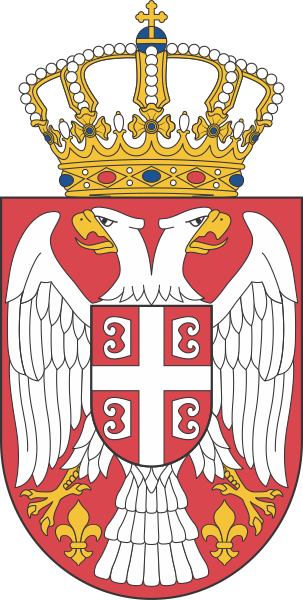
Blazon: Gules a double-headed eagle displayed argent armed, in base two fleurs-de-lis or, overall an escutcheon of the field a cross between four firesteels addorsed of the second
While the eagle has its roots in Byzantine symbolism, it does not actually go back that far; it was probably adopted as a callback to the ancient might of Rome. It was probably first used in the late twelfth century by the Nemanjić dynasty, but it quickly became associated with the Serbian state, and several subsequent dynasties also used the double-headed eagle. It’s not clear that the specific tinctures were well-established or consistent until the 15th to 16th century.
The cross and firesteels probably also have their roots in Byzantine iconography - specifically, the final Palaiologan dynasty. In that context, the firesteels were probably Betas, standing for the motto “King of kings, ruling over kings,” or Basileus Basileōn, Basileuōn Basileuontōn in Greek. The direct transmission of these symbols from Byzantium to Serbia is possible - the timelines just about line up - but I’m not very confident in that. It really came into established use in the mid-to-late fourteenth century, and has been pretty much ever since. (Even the Soviets didn’t break the streak!)
The arms were initially adopted in 1882, upon the establishment of the Kingdom of Serbia, and used with some minor modifications through 1945. From 1918 through 1941, as the Kingdom of Serbs, Croats, and Slovenes (later the Kingdom of Yugoslavia), the inescutcheon incorporated the Croatian chequy argent and gules and azure three molets of six points in chevron or, in base a crescent argent to represent the Slovenes. The component pieces were discarded after the Axis powers split up the kingdom, and General Milan Nedić was installed as the head of a puppet government under Nazi Germany.
After the end of World War II, the Socialist Republic of Serbia was established as part of the Socialist Federal Republic of Yugoslavia. This, too, continued the tradition of extremely ugly Soviet heraldry, although they get very partial credit for incorporating the firesteels. (Presumably the cross was removed due to the religious symbolism.) The Republic of Serbia was established in 1992, and finally went back to the former 1882 arms in 2004.
15 notes
·
View notes
Photo
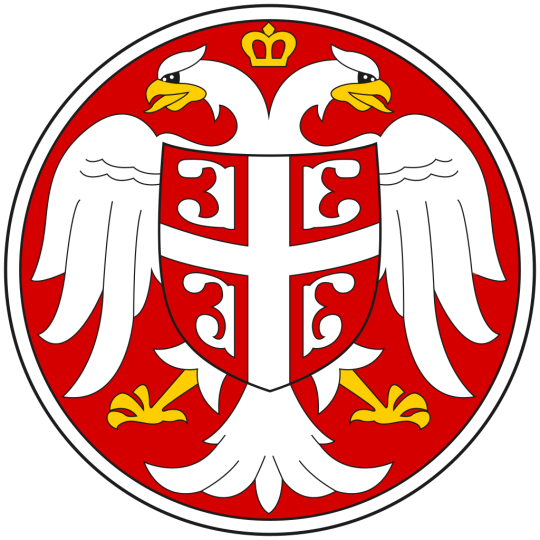
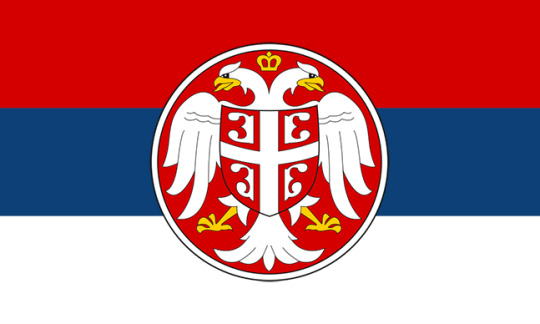
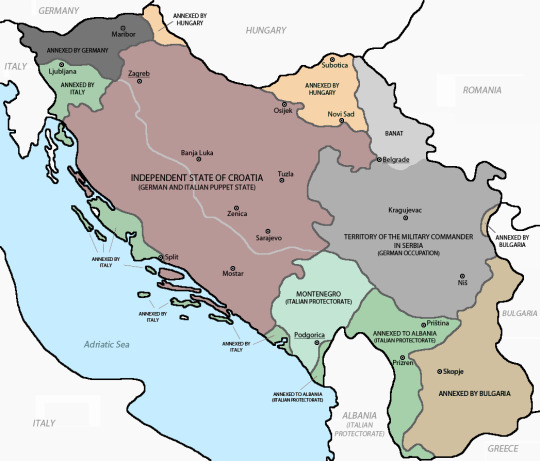
The Commissioner Government (Serbian: Комесарска влада, Komesarska vlada) was a short-lived Serbian collaborationist puppet government established in the German occupied territory of Serbia within the Axis-partitioned Kingdom of Yugoslavia during World War II. It operated from 30 April to 29 August 1941, was headed by Milan Aćimović, and is also referred to as the Commissars Government or Council of Commissars. Of the ten commissioners, four had previously been ministers in various Yugoslav governments, and two had been assistant ministers. The members were pro-German, anti-Semitic and anti-communist, and believed that Germany would win the war. The Aćimović government lacked any semblance of power, and was merely an instrument of the German occupation regime, carrying out its orders within the occupied territory. Under the overall control of the German Military Commander in Serbia, supervision of its day-to-day operations was the responsibility of the chief of the German administrative staff, SS-Brigadeführer and State Councillor, Harald Turner. One of its early tasks was the implementation of German orders regarding the registration of Jews and Romani people living in the territory, and the placing of severe restrictions on their liberty.
In early July, a few days after a communist-led mass uprising commenced, Aćimović reshuffled his government, replacing three commissioners and appointing deputies for most of the portfolios. By mid-July, the Germans had decided that the Aćimović regime was incompetent and unable to deal with the uprising, and began looking for a replacement. This resulted in the resignation of the Commissioner Government at the end of August, and the appointment of the Government of National Salvation led by former Minister of the Army and Navy Armijski đeneral[a] Milan Nedić, in which Aćimović initially retained the interior portfolio. The members of the Commissioner Government accepted collaboration with the occupiers as a means to spare Serbs from political influences that they considered more dangerous than the Germans, such as democracy, communism and multiculturalism. They actively assisted the Germans in exploiting the population and the economy, and took an "extremely opportunistic" view of the Jewish question, regarding their own participation in the Holocaust as "unpleasant but unavoidable". There is no evidence that the collaboration of the Commissioner Government moderated German occupation policies in any way.
https://en.wikipedia.org/wiki/Commissioner_Government
1 note
·
View note
Text
governments aren't people.
you can criticize a corrupt and evil government without it being ~racist~ against the predominant ethnic demographic.
same way corporations aren't people. despite being comprised of people, the entity is not and should not be anthropomorphized.
china? evil. turkey? evil. russia? evil. brunei? evil. iran? evil. sudan, uganda, nigeria? evil, evil, evil. these countries' modern systems are built on foundations of corruption, tyranny, hatred, judgment, bigotry, condemnation, hypocrisy, and dispassion.
now granted they're like that because england spain france and the united states have gone to interfere with them and supplanted corporate sponsored dictators and siphoned them the resources needed to grip their citizens with an iron fist, in order to make themselves look better in the grand scheme of world events. well hey england can't be that bad they don't criminalize queers (anymore, even though the queen was literally alive and in power while that was happening, but whatever). america can't be that bad women can vote (even tho there's women alive who couldn't vote in their lifetime). france can't be that bad they don't execute any dissenters (even tho guillotine was still used in the 1970s). spain can't be that bad they aren't commies. western europe turned them evil for power and control.
europe turned the world evil because they were brown. they aren't evil because they're brown. they're evil because they were targeted and modified and destroyed and rebuilt like the golden calf. colonialism tore away the ethics and morality and compassion and love that the cultures were based on and replaced them with fascism. [except for the former ottoman and holy roman empires which hey guess what were also bad because colonialism]. they were victims that rose from the ashes as shadows of their former selves. and the people running it now are perfectly content with the status quo, getting cash and teen brides siphoned to them by the UN's main players, whoring out their citizens for the lifestyle of luxury. they either chose this or were brainwashed irreparably. either way it's too late for them. they're gone.
it isn't because they're brown. I don't say these things because I look down on those cultures. those people. I don't hate chinese or serbian or middle eastern or african or anyone. I don't think everyone of those ethnic demographics are inferior, or that all should suffer for the actions of the few. it has nothing to do with where they come from or what they look like. these accusations are entirely based on the actions that those in government positions have performed and showcased. those people running governments in oppressive regimes are evil, and they are killing their own. it would be more racist of me to look the other way and twiddle my thumbs and put on a plastic smile and pretend that everything's okay and there's no /possible/ way that a chinese person could be evil (I mean assuming that chinese people are good at math is racist even though it's a good thing, the same logic applies here) and only focus on what all the white countries are doing wrong, because I would be bringing in biases based on ethnicity. plus logically, which is more likely, that my criticisms of the corrupt systems are based on the dozen random ethnic backgrounds SPECIFICALLY rather than the fact that all of them do the same evil corrupt shit, or the fact that european white colonialism affected them all the exact same way and the european white colonialists would only invade and supplant the nonwhite nations and that's why there are no white-run countries on this list (except for russia but russians are asian, not white, the ruling party just happen to be white-passing, unless you take into consideration the history behind why everything after tsar nicky was suddenly different, totally not because of fucking england or anything lmao it's not like england was a major player in a massive war or anything lmao it's not like england fucking put commie puppets on the throne to make soviets the big threat over the next century rather than focusing on all the evil shit england did in the mid-twentieth century or anything LMAO). ITS ALMOST LIKE IT WAS ENGINEERED TO LOOK THAT WAY BY DESIGN 🤔🤔 SO WEIRD 🤔🤔
1 note
·
View note